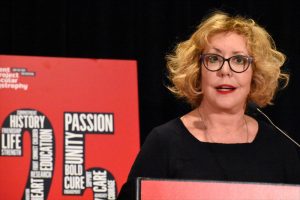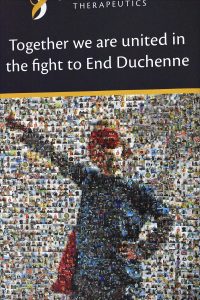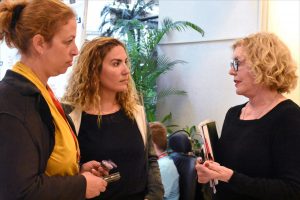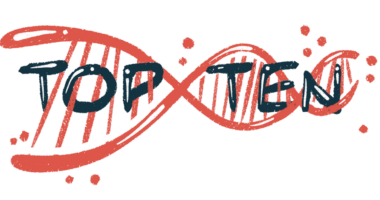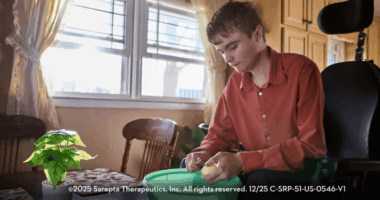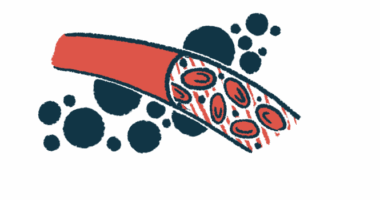As PPMD Turns 25, Founder Pat Furlong Reflects on Advances in Duchenne
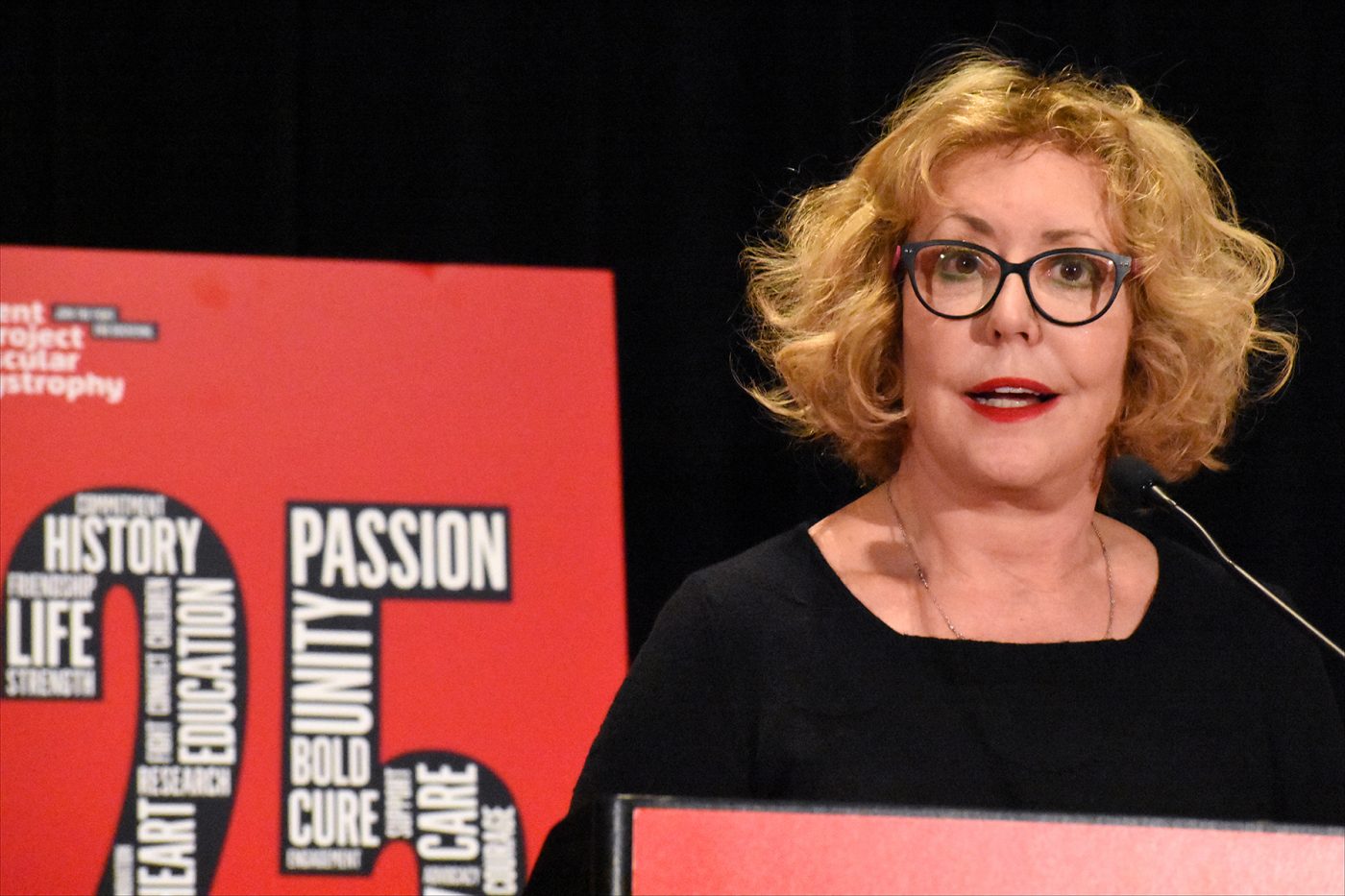
Pat Furlong, founder and president of Parent Project Muscular Dystrophy, speaks in Orlando at PPMD’s 25th annual conference. (Photo by Larry Luxner)
Back in June 1984, a doctor calmly informed Pat Furlong that her sons — 4-year-old Chris and 6-year-old Patrick — had Duchenne muscular dystrophy. It was the first time she had ever heard those three words uttered together.
The disease eventually claimed both boys, but that didn’t stop Furlong’s fight against DMD. In 1994, she and some other moms and dads in the same situation formed the Duchenne Muscular Dystrophy Research Foundation, which soon changed its name to Parent Project Muscular Dystrophy (PPMD).
The group’s first meeting took place that year at a small hotel in Orlando, Florida, and was attended by 35 people.
Late last month, the PPMD convened in Orlando again — only this time it was at the Renaissance at Sea World, and some 800 people were in attendance. So were officials from at least 20 of the 46 pharmaceutical companies currently focusing on the disease, an indication of how far science has come since the early days.
Chief sponsors of the June 26-30 gathering included PTC Therapeutics, Santhera Pharmaceuticals, Sarepta Therapeutics, Roche, FibroGen, Pfizer and Solid Biosciences.
“Twenty-five years ago, the unknown parts were significantly greater than the known parts,” Furlong told Muscular Dystrophy News. “I spent all my time researching and reading every single paper I could find on Duchenne. At the time, there was no social media — which was probably a gift because it would have probably thrown my entire family over the edge.”
The Muscular Atrophy News forums are a place to connect with other patients, share tips and talk about the latest research. Check them out today!
These days, she said, Duchenne parents have far more reason to be hopeful. For one thing, average life expectancy for DMD patients has increased from 16 to 26 years — and some men with Duchenne are living into their 30s, 40s and even 50s. Yet, the questions are more complicated.
“What would you do if this were your son? What do you search for? Where do you go?” she said. “We’re a pretty big community with contacts around the globe. Still, every person diagnosed with DMD needs access to optimal care and therapies, and those therapies need to be reimbursed so that no family goes bankrupt. So it’s our job to raise our collective voices worldwide.”
PPMD urges better clinical trials
One priority of the conference was discussing how clinical trials could be better designed to accommodate Duchenne families.
“Exposing these boys to a placebo even for six months when you know the trajectory of this disease is too much,” she said. “It’s hard on our sons and our families. We have limited time. Just maybe we could get away from placebos, which would be ideal for our children, and maybe for ourselves.”
Just getting all boys with Duchenne into trials would be an impressive accomplishment, she said. Yet, even that won’t be enough.
“There’s another hurdle — access and reimbursement — and how to describe what a clinically meaningful difference is. A boy who doesn’t walk anymore but can now lift his arms above his head is meaningful. For payers to say ‘no, he has to be walking’ represents a lack of understanding of DMD. So, we as a community have a lot of work to do.”
That includes getting Duchenne added to the Recommended Uniform Screening Panel (RUSP) of the U.S. Department of Health and Human Services. In May, PPMD launched a $5 million pilot program to screen 100,000 newborns in New York state over a two-year period.
Since 1994, PPMD has invested more than $50 million in Duchenne research, covering every single therapeutic possibility for the disease. These contributions, it says, “have led to advancements inspiring an additional $500 million investment in research from the federal government.”
All told, pharmaceutical companies have spent a cumulative $8 billion in the fight to end Duchenne, according to PPMD.
Besides drug firms, a number of nonprofit organizations also attended PPMD’s 2019 Annual Conference, including the Jett Foundation, Hope for Gus, Team Joseph and the Little Hercules Foundation. Speakers lectured on a variety of subjects, from the importance of diet and physical therapy to how to talk to your children about Duchenne. Barry Byrne, MD, director of the Powell Gene Therapy Center at the University of Florida in Gainesville, offered a comprehensive introduction to gene therapy research in Duchenne.
‘Grief is a creeper’
One particularly poignant moment came when Lance Hester spoke about life with his 16-year-old son, Micah, who was diagnosed with Duchenne at age 3.
“He’s got a rare mutation, one that I haven’t heard anyone else describe for their son,” said Hester, a PPMD board member and attorney from suburban Seattle. “He’s been in a wheelchair since he was 10. Physically, he’s pretty much classically followed the curve of the disease.”
Hester said he gets emotional at unexpected times — like when Facebook reminds him it’s been exactly nine years since he posted a photo of Micah walking hand in hand with his grandfather on Father’s Day, or a picture of him skiing or doing other things he can no longer do.
“Sometimes I wonder why we all aren’t perpetually depressed, given that Duchenne is 100% fatal — and I think the reason is that we have these beautiful, intelligent, fun, amazing sons of ours,” he said. “Unfortunately, their greatness is the reason we’re able to overlook the grieving, because grief is a creeper with Duchenne. It creeps up on you when you least expect it.”
The conference wasn’t limited to Americans. Scientists, researchers and patient advocates came from several other countries, people like Antenor Castro Minto of Brazil; David Bull, MD, director of research at London-based Duchenne UK; and Filippo Buccela, who heads Parent Project Italy.
Also in attendance was Tali Kaplan, president of the Israeli nonprofit group Little Steps. She said the event in Orlando marked the eighth time she’s made the trip halfway around the world from Tel Aviv to attend a PPMD conference.
Kaplan first attended the annual meet in 2010, after her son, Ido, was diagnosed with Duchenne.
“Although it’s a long journey to get there, it’s very important for me as the leader of an associated organization and Israel, and as a parent, to take part in this conference where I can meet families, physicians and researchers,” she said. “The Israeli community thanks Pat and the PPMD team for their great leadership and effort to end Duchenne.”




